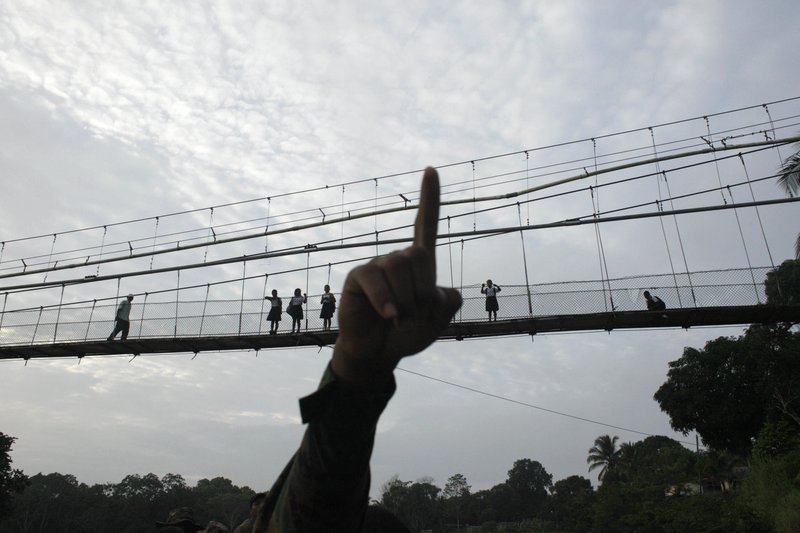Panama ordered to up care for migrants
PANAMA CITY -- A regional human rights court has ordered Panama's government to immediately provide medical care and more sanitary conditions for some 2,000 migrants detained near the Colombian border.
Before the coronavirus pandemic, Panama had practiced what it called a "controlled flow," which allowed migrants emerging from the dangerous Darien jungle to rest at camps before boarding buses and continuing their journey up through Central America.
Now border police are holding migrants in those camps as covid-19 infections spread.
This week the Inter-American Court of Human Rights ordered the government to safeguard the welfare of the migrants held in Penitas and Lajas Blancas.
[CORONAVIRUS: Click here for our complete coverage » arkansasonline.com/coronavirus]
The migrants are from Haiti and Cuba, as well as African and Asian nations. About 80 infected with the virus were moved to Lajas Blancas, the second camp along the route. Dozens of others with symptoms or who had contact with the infected have been sent there as well.
The court said the Penitas shelter was still far beyond its capacity with nearly 1,700 people there including more than 400 children. It ordered immediate "access to essential health services without discrimination to all of the people" in the camps.
Knights founder on path to sainthood
VATICAN CITY -- The founder of the Knights of Columbus, the influential U.S.-based lay Catholic organization, is moving a step closer to possible sainthood.
Pope Francis has approved a miracle attributed to the intercession of the Rev. Michael McGivney, a Connecticut priest who died at age 38 of pneumonia in 1890 during a pandemic similar to the current coronavirus outbreak.
He would be the first U.S. parish priest to be beatified, the first major step before canonization.
The Vatican said Wednesday that Francis had signed off on the miracle required. The Knights said it concerned the medically inexplicable cure of a baby with a life-threatening condition who was healed in utero in 2015 "after prayers by his family to Father McGivney."
McGivney founded the Knights of Columbus in 1882 in New Haven, Conn. Today the Knights are one of the biggest Catholic organizations in the world, known for their charitable efforts and counting about 2 million members in the Americas, Caribbean, Asia and Europe.
The organization is also an insurer, boasting more than $100 billion in financial protection for members and their families.
No date has been set for the beatification, which the Knights said would be held in Connecticut.
Rwandan gets life term for genocide
KIGALI, Rwanda -- A Rwandan court Thursday sentenced to life in prison one of the most wanted men in the country's 1994 genocide in which more than 800,000 ethnic Tutsis and Hutus who tried to protect them were killed.
Ladislas Ntaganzwa, who had a bounty of up to $5 million on his head, had faced charges of genocide, extermination as a crime against humanity and rape as a crime against humanity. He denied the charges.
Ntaganzwa's conviction comes less than two weeks after another high-profile fugitive, Felicien Kabuga, was arrested in France after a quarter-century on the run. The wealthy businessman is accused of supplying machetes to the killers in the genocide and broadcasting propaganda urging mass slaughter.
On Wednesday, Kabuga appeared in a French court and denied the charges. His request for bail was denied. He seeks trial in France and not in Africa.
Ntaganzwa, a former mayor of Nyakizu in Rwanda's south, was arrested by agents of Interpol in Congo in 2015 and transferred the next year to Rwanda to face trial.
He is accused of substantially participating in the planning, preparation and execution of the massacre of more than 20,000 Tutsis at Cyahinda parish. According to the indictment, he addressed the surrounded Tutsis and told them to lay down their arms. Then he gave the order for the massacre to begin, "whereupon the gendarmes and communal police shot at the crowd."
Curb urged on 2 drugs to treat covid-19
NICOSIA, Cyprus -- Cyprus' Health Ministry on Thursday advised doctors to curtail the use of chloroquine and hydroxychloroquine on some covid-19 patients amid renewed concerns that the drugs could trigger heart problems and put lives at risk.
The ministry urged doctors Thursday to be "particularly vigilant" and to even stop administering the two substances to covid-19 patients with preexisting heart conditions.
The ministry said an advisory body of medical experts is reevaluating the use of the drugs and may revise its directives.
The announcement came after the World Health Organization said it would temporarily drop hydroxychloroquine from its global study into experimental covid-19 treatments.
A paper published last week in the Lancet showed people taking hydroxychloroquine were at higher risk of death and heart problems than those who were not.
Cyprus' health minister said last month that the country was among the first nations to approve use of the anti-malaria drug to treat covid-19 patients.
A Section on 05/29/2020
